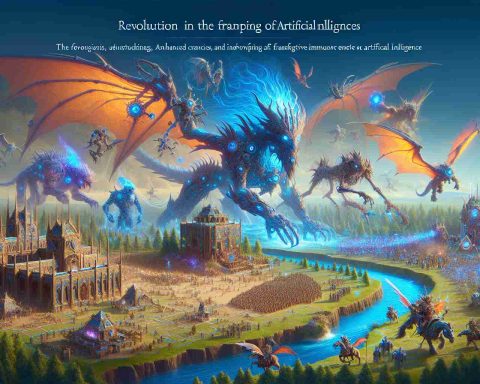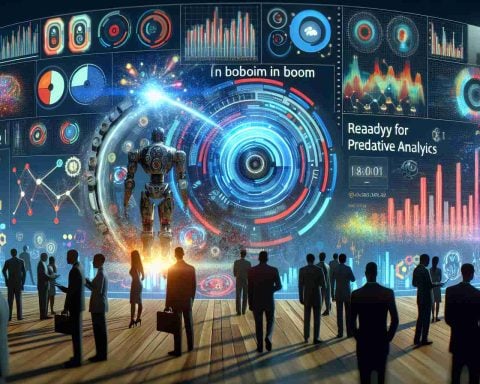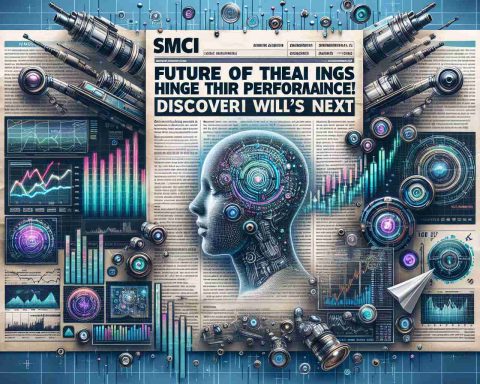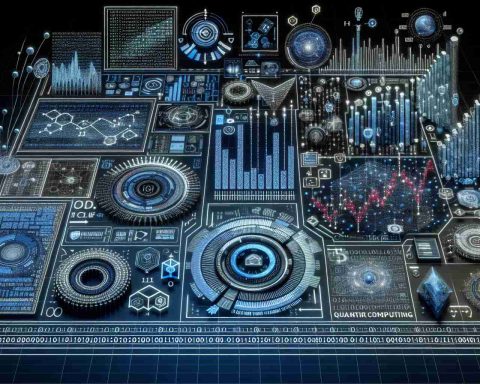The digital landscape of gaming is witnessing a silent yet significant revolution, one that intertwines technology with human interaction in profound ways. As we delve deeper into this transformation, several facets emerge that have not been fully explored.
Environmental Impact: An often-overlooked aspect of gaming’s evolution is its environmental footprint. With the increased power and energy demands of high-performance computing solutions offered by companies like Super Micro Computer, Inc. (SMCI), a new dialogue on sustainability is imperative. Can the gaming industry balance cutting-edge innovation with ecological responsibility? Advances in energy-efficient computing and green data center solutions might hold the answer.
Societal Implications: As gaming technology progresses, ethical considerations come to the fore. AI-driven characters and virtual worlds bring about questions of digital ethics, privacy, and digital equity. What does the rise of autonomous characters mean for storytelling and user experience? The potential for AI to mirror human behavior comes with its own set of advantages and ethical dilemmas.
Global Inequality: The rapid pace of technological advancement risks widening the gap between tech-savvy regions and those with limited access. While AI and cloud gaming democratize gaming by reducing the need for expensive hardware, areas with underdeveloped internet infrastructures could be left behind. Could initiatives aiming for global internet access alleviate this divide?
Future Prospects: While these technologies promise dazzling user experiences, they also herald complex challenges. Balancing innovation with ethical responsibility, environmental considerations, and global accessibility will be crucial as we navigate this futuristic gaming frontier.
For further insights into these technological and ethical considerations, explore more on Super Micro.
The Impact of Gaming’s Digital Revolution on the Future of Humanity
The gaming industry’s rapid evolution, woven tightly with advancements in technology, is reshaping not just how we play but how we understand our world. As we dive into this digital transformation, it becomes clear that its implications extend far beyond pixels and screens, affecting the environment, society, and the global economy in profound ways. One aspect deserving particular attention is the environmental impact of this digital revolution and its connection to the future of humanity.
Environmental Impact and the Future of Sustainability
The gaming industry, driven by high-performance computing and continuous technological innovation, is facing a growing environmental challenge that might seem counterintuitive to gamers engrossed in virtual worlds. These advancements demand substantial energy resources, resulting in an increased carbon footprint. Companies like Super Micro Computer, Inc. (SMCI) have advanced the capabilities of gaming hardware, pushing for higher performance with every iteration. However, this race for power and realism comes at an environmental cost.
As global awareness of climate change intensifies, the gaming industry’s footprint highlights the pressing need for sustainable solutions. The energy consumption associated with gaming is not limited to personal devices; it extends to data centers that support increasingly popular cloud gaming services. These centers require continuous operation, demanding vast amounts of electricity around the clock.
The challenge, therefore, is to find a balance between technological innovation and ecological responsibility. Advances in energy-efficient computing are promising steps in this direction. Innovations in green data center solutions and the potential integration of renewable energy sources offer glimpses of a sustainable gaming future. However, realizing this vision will require concerted efforts and significant investment in research and infrastructure alterations.
The environmental implications of gaming’s expansion are a microcosm of a larger narrative: the enduring conflict between technological progress and environmental stewardship. The gaming industry has the unique opportunity to pioneer solutions that can influence other sectors and set a precedent for integrating sustainability into development plans. For the future of humanity, addressing these environmental concerns means securing a livable planet that can support emerging technologies long-term.
This environmental awareness connects with the broader aspirations of humanity’s future, hinting at a larger dialogue about responsible innovation. As we embrace new technologies, the gaming industry must reflect a growing realization that progress at the expense of ecological health is unsustainable. By adopting energy-efficient practices and championing sustainability initiatives, the industry could serve as a catalyst for change, demonstrating that technological innovation need not occur at the environment’s expense.
Ultimately, the gaming industry’s approach to its environmental footprint could echo throughout the world. As technology continues to shape our global landscape, finding solutions that harmonize with our planet’s needs can determine the kind of world we leave for future generations—a world where leisure activities, like gaming, coexist peacefully with nature. This balance is not just necessary but pivotal for the prosperity and sustainability of humanity’s future.
The Underrated Innovations and Challenges in the Evolving Gaming Landscape
The gaming industry is at the cusp of a significant transformation, driven by the intricate integration of technology and human interaction. This evolution is not just reshaping how games are played but is also impacting broader aspects of society and the environment. Here, we explore some of the nuanced elements that deserve attention as gaming technology advances.
Environmental Impact: A Double-Edged Sword?
With evolving gaming technologies, the environmental impact is a critical area that warrants deeper consideration. High-performance gaming systems, like those from companies such as Super Micro, require substantial energy, raising questions about their ecological footprint. Innovations in energy-efficient hardware and sustainable data centers are emerging as pivotal solutions to mitigate these environmental concerns.
The AI Conundrum: Ethical Implications of Intelligent Characters
As AI-driven characters become more prevalent, they introduce considerable ethical debates. The ability of AI to replicate human-like behavior in gaming worlds could redefine storytelling and user engagement. However, it also raises concerns about privacy, digital rights, and how these advanced virtual personalities might influence societal norms. Developers and ethicists must work together to address these challenges without stifling innovation.
Bridging the Global Inequality Gap
While technological advancements in gaming, such as AI and cloud-based platforms, strive to make gaming more accessible, they also risk exacerbating global inequalities. Regions with limited internet infrastructure might be unable to harness these innovations fully. Initiatives focused on expanding internet connectivity globally are crucial to ensuring that gaming’s benefits do not remain confined to well-connected regions.
Pros and Cons of Next-Gen Gaming Technologies
– Pros: Enhanced user experience, democratization of gaming through cloud solutions, innovative storytelling possibilities with AI.
– Cons: Increased energy consumption, ethical dilemmas with AI, potential widening of digital divides.
Predicting the Future: Balancing Progress with Principles
The future of gaming is poised with dazzling possibilities, yet it demands careful navigation of several complex issues. Ensuring that progress in gaming technology aligns with ethical conduct, environmental sustainability, and global inclusivity will be paramount. This balance will define the next chapter in gaming’s ever-evolving story.
For those interested in diving deeper into the intersection of technology, ethics, and gaming, further exploration on platforms like Super Micro offers valuable perspectives.




















